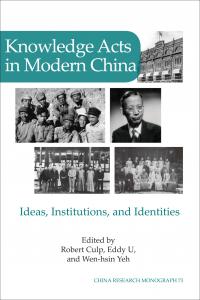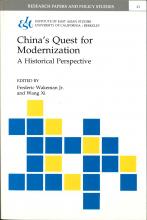Knowledge Acts in Modern China
Knowledge Acts in Modern China
Robert Culp, ed., Eddy U, ed., Wen-hsin Yeh, ed.
This volume explores the introduction of new systems of knowledge in China during the early twentieth century. The individuals portrayed here illustrate how modern systems of thought gave life to social institutions and generated new social roles during China’s tumultuous transition. We track the formation of academic and professional disciplines representing scientific rationality, technical regulation, impersonality, and intellectual enlightenment, all thought to be constitutive, as well as indicative, of modernity.
As a nonprofit academic press, we need your support to publish our books. Your gift can help us make more of our titles available as e-books. DONATE NOW
Title information
This volume explores the introduction of new systems of knowledge in China during the first half of the twentieth century. The individuals portrayed here illustrate how modern systems of thought gave life to social institutions and generated new social roles and identities in China’s tumultuous transition during the first half of the twentieth century. In particular, we track the formation of academic and professional disciplines that have represented scientific rationality, technical regulation, impersonality, and intellectual enlightenment, all thought to be constitutive, as well as indicative, of modernity. With such a focus, this book joins an ongoing discussion about Chinese experiences of modernity as a social and material process, in addition to encompassing a mindset and new systems of ideas. This book extends this inquiry to consider how the interplay among ideas, institutions, and identities has characterized and shaped Chinese modernity.
Contributors:
Clayton D. Brown is Assistant Professor of History and Asian Studies at Utah State University. He has investigated issues related to archaeology and ethnic conflict in modern China and his work has appeared in Orientations, The China Journal, Education about Asia, and many others. He is currently preparing a full-length study of Sino-American collaboration in archaeology and cultural heritage management.
Timothy Cheek is Professor and Louis Cha Chair in Chinese Research at the Institute of Asian Research and the Department of History at the University of British Columbia. His research, teaching, and translating focus on the recent history of China, especially the role of Chinese intellectuals in the twentieth century and the history of the Chinese Communist Party. His most recent book is The Intellectual in Modern Chinese History (2015).
Robert Culp is Associate Professor of History and Asian Studies at Bard College in New York’s Hudson Valley. He is the author of Articulating Citizenship: Civic Education and Student Politics in Southeastern China, 1912–1940. He is currently completing a book on intellectuals’ cultural activities in China’s publishing industry during the twentieth century.
Bryna Goodman is Professor of Modern Chinese History at the University of Oregon. Her publications include Twentieth-Century Colonialism and China: Localities, the Everyday, and the World; Gender in Motion: Divisions of Labor and Cultural Change in Late Imperial and Modern China; and Native Place, City, and Nation: Regional Networks and Identities in Shanghai. Her current areas of research include twentieth-century Chinese newspaper culture, gender and the early Chinese republic, and early understandings of finance capitalism.
J. Megan Greene is Associate Professor of History at the University of Kansas. She works on the history of Republican China both in China and on Taiwan, focusing in particular on nation- and state-building projects in the areas of science, the economy, and academia. She is currently working on a project on scientific and technical modernization in inland China during the Sino-Japanese War.
Tze-ki Hon is Professor of History at the State University of New York at Geneseo. He is the author of four books: The Yijing and Chinese Politics (2005), Revolution as Restoration (2013), Teaching the I Ching (Book of Changes) (2014; with Geoffrey Redmond), and The Allure of the Nation (2015). Currently, he is studying Chinese views of the twentieth-century global system.
Elisabeth Köll is Associate Professor of History at the University of Notre Dame. Her work focuses on business institutions and practices in the context of China’s evolving modern state and economy. She has published From Cotton Mill to Business Enterprise: The Emergence of Regional Enterprises in Modern China (2003), as well as various articles, book chapters, and case studies. Currently, she is completing a book manuscript titled “Railroads and the Making of Modern China.”
Sun Huei-min is an associate research fellow in the Institute of Modern History, Academia Sinica. Her research ranges across legal history, social-cultural history, and the history of education in nineteenth- and twentieth-century China. She is the author of Zhidu yizhi: Minchu Shanghai de Zhongguo lüshi, 1912–1937 (Institutional transplantation: Chinese lawyers in Shanghai, 1912–1937).
Glenn D. Tiffert is a postdoctoral fellow at the Lieberthal-Rogel Center for Chinese Studies at the University of Michigan, Ann Arbor. His research interests center on late Republican and early PRC legal history. His recent publications include a study of the drafting of the 1954 PRC Constitution, and a study of the development of the Republican court system. His current book project looks at the birth of the PRC judicial system through the lens of revolutionary Beijing.
Eddy U is Associate Professor of Sociology at the University of California, Davis. He is working on a book on the intellectual as a classification of individuals under Chinese Communism. His recent works on the social construction of the intellectual, petty-bourgeoisie, and Marxist classes under Chinese Communist rule have been published in The China Journal, Modern China, the British Journal of Sociology, and the European Journal of Sociology.
Timothy B. Weston is Associate Professor of History at the University of Colorado Boulder. He is currently working on a book on journalists and journalism in late nineteenth- and early twentieth-century China. Among his recent publications are “Taiwanese Newspapers and Politics in China’s Shadow,” in Mobile Horizons: Dynamics across the Taiwan Strait (2013), and China in and beyond the Headlines (2012), coedited with Lionel M. Jensen.
Wen-hsin Yeh is Richard H. and Laurie C. Morrison Chair Professor in History at the University of California, Berkeley, where she was formerly director of the Institute of East Asian Studies. She is Senior China Adviser to Chancellor Nicholas Dirks. Her current project concerns the history of reading and publishing Chinese classics in China’s twentieth century.
Robert Culp, ed.
Robert J. Culp is associate professor of history and chair of the Social Studies Division at Bard College.
Eddy U, ed.
Eddy U is associate professor of sociology at the University of California, Davis. His research interests include political sociology, historical sociology, the sociology of intellectuals, and Chinese society and politics. He is the author of Disorganizing China: Counter-bureaucracy and the Decline of Socialism (Stanford University Press, 2007) and co-editor of Knowledge Acts in Modern China: Ideas, Institutions, and Identities (Institute of East Asian Studies, UC Berkeley, 2016).
Ph.D. at University of California, Berkeley
Wen-hsin Yeh, ed.
Wen-hsin Yeh is professor of history at the University of California, Berkeley. She has served as the director of the Institute of East Asian Studies and the chair of the Center for Chinese Studies at Berkeley. She has edited and contributed to many IEAS publications, including Mobile Subjects; Mobile Horizons; History in Images; Cities in Motion; Empire, Nation, and Beyond; Cross-Cultural Readings of Chineseness; Landscape, Culture, and Space in Chinese Society; and Shanghai Sojourners.
B.A., History, National Taiwan University; M.A., History, University of Southern California; Ph.D., History, University of California, Berkeley
Knowledge Acts in Modern China: Ideas, Institutions, and Identities (CRM 73)
Introduction: Knowledge Systems, Knowledge Producers, and China’s Distinctive Modernity – Robert Culp and Eddy U
Part I. New Systems of Academic Learning
1. Coming to Terms with Global Competition: The Rise of Historical Geography in Early Twentieth-Century China– Tze-ki Hon
2. Drawing Boundaries in Sand: Anthropology in Republican China – Clayton Brown
Part II. Technical Knowledge and the Professions
3. From Literati to Legal Professionals: The First-Generation Chinese Law School Graduates and Their Career Patterns – Huei-min Sun
4. The Chinese Judge: From Literatus to Cadre, 1906-1949 – Glenn Tiffert
5. The Making of the Civil Engineer in China: Knowledge Transfer, Institution Building, and the Rise of a Profession – Elisabeth Köll
Part III. Media and the Market
6. Economics with Chinese Characteristics: The Production of Economic Knowledge in Early Republican China – Bryna Goodman
7. Mass Production of Knowledge and the Industrialization of Mental Labor: The Rise of the Petty Intellectual – Robert Culp
8. Journalism as a Field of Knowledge in Republican China: Ideas, Institutions, and Politics– Timothy B. Weston
Part IV. Party Control and Construction
9. Looking Toward the Future: State Standardization and Professionalization of Science in Wartime China – J. Megan Greene
10. Making Maoism: Ideology and Organizations in the Yan’an Rectification Movement, 1942-1944 – Timothy Cheek
11. The Formation of Intellectuals in Yan’an – Eddy U
|
“The volume rightly demonstrates how the evolution from literati to professional to mobilized intellectual was by no means inevitable. Rather, this evolution was a complex process, with state institutions, commercial markets, imperialists, and the war all contributing to myriad cultural, institutional and political conditions that informed how knowledge producers authenticated their status and defined their agendas. [...] The empirical case studies are fascinating unto themselves, but the overall volume makes an important contribution to the field by helping us better understand how, during a pivotal era in Chinese history, knowledge was produced, by whom, and for what purposes.” ~Eugenia Lean, Columbia University, in Frontiers of Literary Studies in China, 2018, 12(4): 715-719. (http://journal.hep.com.cn/flsc/EN/10.3868/s010-007-018-0036-4) |


